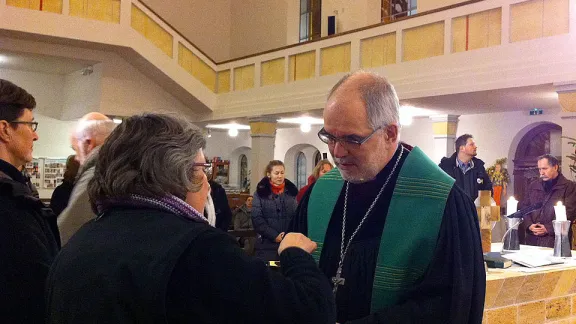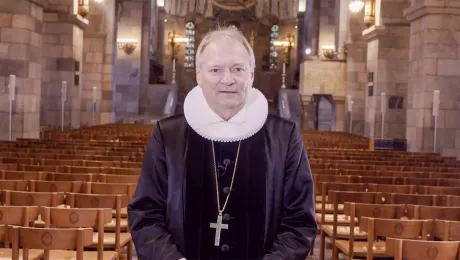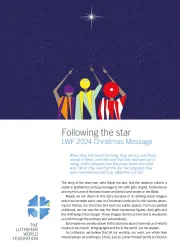
DELKU Bishop Uland Spahlinger at the opening worship service at St Paul's Lutheran Church in Odessa. © LWF/Anli Serfontein
Second LWF Workshop on Community Diakonia in Europe
A group of Lutheran pastors, educators and diaconal workers (working in church social services) met in the Black Sea port city of Odessa for an ongoing initiative of The Lutheran World Federation (LWF) European region on reforming community diakonia on the continent.
The 16-19 January workshop was the second meeting of the group, coordinated by the LWF Department for Mission and Development (DMD) Europe Desk under the theme “Seeking Conviviality.” The meetings explore relevant responses to the economic and financial crisis that has affected most of Europe since 2008. The inaugural meeting in Järvenpää, Finland in December 2011 mapped out the growing vulnerability and marginalization of people and discussed emerging holistic approaches to community diakonia in Europe.
The workshops are organized in collaboration with the International Academy for Diakonia and Social Action (interdiac) based in Český Těšín, Czech Republic. Interdiac, a non-profit educational organization promotes learning, networking, research and development for social action in countries within Central and Eastern Europe.
Convening in Odessa was an opportunity for participants to also learn about the social and economic contexts of the German Evangelical Lutheran Church in Ukraine (DELKU), which hosted the event. DELKU is one of the regional churches of the Federation of the Evangelical Lutheran Church in Russia and Other States (ELCROS).
Speaking at the opening worship service at St Paul’s Lutheran Church in Odessa, DELKU Bishop Uland Spahlinger told delegates that before 1914, the Odessa congregation counted 10,000 Lutherans, today it has hardly 250 members. He noted that church life has only returned to the city in the last two decades after nearly 70 years under Communism rule. The Lutheran church itself was only recently renovated after destruction by a fire in 1976.
A Post-Soviet Situation
Spahlinger told Lutheran World Information (LWI) that the situation of the church in Ukraine is different from that in other Eastern European countries such as Poland or the Czech Republic. Ukraine is essentially “a post-Soviet situation, meaning that there is no interaction and virtually no co-operation between the Government and our church,” he said.
“I think it is important for people from Western Europe and Scandinavia to have seen and better understand what our situation is like in the far Eastern part of Europe,” the DELKU bishop said, referring to delegates’ visits to church-run diakonia projects in the greater Odessa area.
The Odessa workshop looked at approaches and methodologies that can help effectively link up local, political and structural levels of social and economic change to build strong partnerships across Europe.
“We are churches in transformation in ever-changing societies. Therefore we are responding to the challenges in which the church also has the resources and know-how to be a key and significant player,” Rev. Dr Eva Sibylle Vogel-Mfato, LWF area secretary for Europe told delegates.
Rev. Tony Addy, head of education at interdiac told participants, “We are at the half-way point of the diaconal process in this consultation. We are here to get to know the Ukrainian context and diakonia through the realities of the Odessa region and to use that as a mirror in our own work.”
Strategies for Change
Speaking on the socio-political situation in Ukraine, Dr Mykhaylo Pustovoyt, head of the Institute of Psychology and Psychotherapy in Odessa, told delegates that the instability of the political and judicial system in the country had meant that after the Orange Revolution—the civil society protests after the 2004 presidential election—people yearned for strong leaders. “In such an unstable system people do not learn to cooperate and work together.” This, he said, affects the work of the church in communities and within society.
Delegates discussed four themes: vocation, conviviality, justice and dignity, which will be part of the content for a document on strategies for change and the next steps in the process.
The core-group of participants in the “Seeking Conviviality” workshops comes from 14 countries in the three LWF regions of Central Eastern and Central Western Europe and the Nordic region. At the Odessa meeting, they assessed the first practical steps in advocating a new perspective on community diakonia, and deliberated ways of sharing the European experiences with the global LWF communion. The next meeting is scheduled for the second half of 2013.
(Written for LWI by Berlin-based journalist Anli Serfontein)
More information about the “Seeking Conviviality” process.


